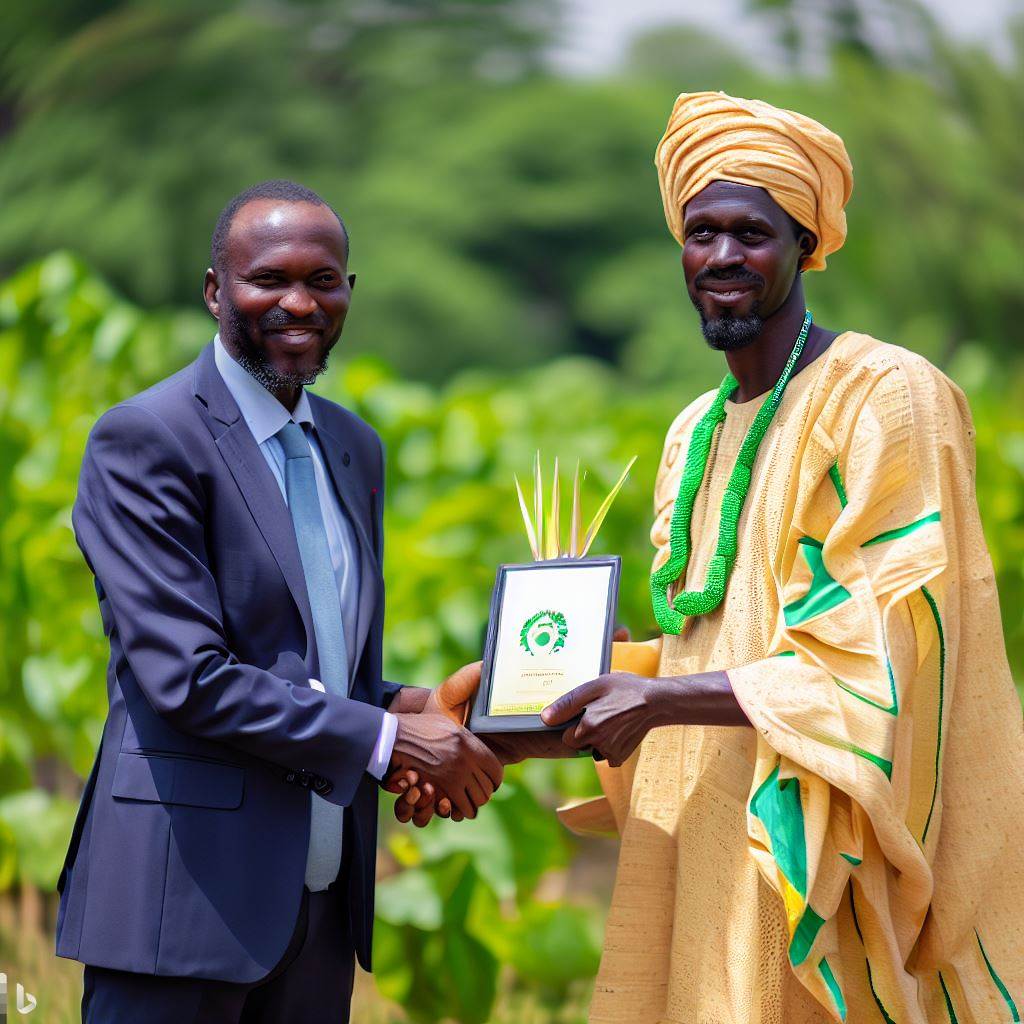Introduction
Success stories serve as powerful motivators and learning tools for aspiring entrepreneurs.
They provide real-life examples of individuals who defied odds and achieved remarkable success.
Nigerian farmer entrepreneurs face numerous challenges, including limited resources and infrastructure.
Despite these obstacles, many farmers in Nigeria have managed to build successful businesses and make a positive impact.
One such inspiring success story is that of Olawale Timothy, a young farmer from Oyo State.
Olawale started with just a small plot of land and a dream to revolutionize Nigeria’s agriculture sector.
Through determination and innovation, he implemented modern farming techniques and increased his yields significantly.
Soon, Olawale’s farm became a model for sustainable agriculture, attracting attention and support from government agencies and investors.
His success not only improved his own life but also created employment opportunities for the local community.
Another remarkable success story is that of Funke Oyebola, a female farmer from Kwara State.
Funke faced cultural barriers and gender stereotypes but refused to let them limit her aspirations.
She started a poultry farm and became a prominent supplier of quality poultry products.
Funke’s success empowered other women in her community to pursue entrepreneurship and break gender norms.
These success stories reflect the potential of Nigerian farmer entrepreneurs to drive economic growth and transform agriculture.
By sharing their stories, we can inspire others and promote the importance of investing in agriculture.
The success stories of Nigerian farmer entrepreneurs highlight the resilience, innovation, and determination required for success in entrepreneurship.
These stories serve as powerful reminders that with the right mindset and strategies, anyone can achieve greatness.
Background of Nigerian agriculture sector
A. Overview of Nigeria’s agricultural sector
- Nigeria’s agricultural sector is an important contributor to the country’s economy.
- It employs the majority of the population, especially in rural areas.
- The sector contributes to food security and provides raw materials for industries.
B. Challenges faced by farmers in Nigeria
- Limited access to credit and capital to invest in modern agricultural practices and equipment.
- Poor infrastructure, including inadequate transportation and storage facilities, affecting the supply chain.
- Climate change impacts such as droughts, floods, and soil degradation that affect crop yields.
- Pests and diseases pose significant challenges to farmers, leading to crop losses.
C. Potential for growth and development in Nigerian agriculture
- Nigeria has a large population and high demand for agricultural products, providing a ready market for farmers.
- Government initiatives and policies are being implemented to boost the agricultural sector.
- Technological advancements, such as the use of precision farming and modern irrigation systems, can improve productivity.
- Export opportunities exist for Nigerian agricultural products, contributing to foreign exchange earnings.
- Access to finance and training programs can empower farmers to adopt modern techniques and increase productivity.
The Nigerian agricultural sector plays a vital role in the country’s economy. Despite the challenges faced by farmers, there is still immense potential for growth and development.
With the right support, including access to finance, infrastructure improvement, and technological advancements, Nigerian farmers can thrive and become successful entrepreneurs.
The government’s commitment to the agricultural sector and the opportunities for both domestic and international markets provide a promising future for Nigerian farmers.
Read: How to Become an Agricultural Operations Manager in Nigeria
Case study – Mr. Ade Adeyemo
A. Brief introduction of Mr. Adeyemo
Mr. Ade Adeyemo is a Nigerian farmer entrepreneur who has made significant strides in the agricultural sector.
With a passion for farming and a determination to succeed, he has become an inspiration to many aspiring farmers.
B. How Mr. Adeyemo started his farming journey
- Mr. Adeyemo’s farming journey started small.
- He grew up in a rural community and observed his parents’ farming activities.
- Inspired by their hard work, he decided to pursue farming as a career.
C. Challenges faced by Mr. Adeyemo initially
Like any entrepreneur, Mr. Adeyemo faced numerous challenges at the beginning of his farming journey.
Lack of access to capital, limited knowledge of modern farming techniques, and unpredictable weather conditions were some of the hurdles he encountered.
D. Strategies and innovative approaches implemented by Mr. Adeyemo
To overcome these challenges, Mr. Adeyemo adopted several strategies. He attended agricultural training programs and workshops to enhance his knowledge.
He also sought financial assistance from agricultural development organizations and established partnerships with other farmers to share resources and expertise.
E. Achievements and recognition received by Mr. Adeyemo
Through his hard work and determination, Mr. Adeyemo has achieved significant success in his farming endeavors.
He has won several awards for his innovative farming techniques and has been recognized as a leading farmer entrepreneur in Nigeria.
F. Impact created by Mr. Adeyemo in the farming community
Mr. Adeyemo’s success has had a positive impact on the farming community.
He has created employment opportunities for local farmers, introduced modern farming techniques, and played a significant role in increasing agricultural productivity in his region.
G. Key lessons learned from Mr. Adeyemo’s success story
- Never underestimate the power of determination and hard work.
- Continuous learning and exploration of innovative approaches are essential for success in farming.
- Building networks and partnerships can help overcome challenges and grow the business.
- Sharing knowledge and expertise with other farmers can contribute to the overall development of the agricultural sector.
Mr. Ade Adeyemo’s success story is an inspiring example for aspiring Nigerian farmer entrepreneurs.
His journey demonstrates that with passion, determination, and strategic approaches, one can overcome challenges and achieve remarkable success in the farming sector.
Read: Case Study: Successful Poultry Producers in Nigeria
Case study – Mrs. Fatimah Suleiman
A. Brief introduction of Mrs. Suleiman
Mrs. Fatimah Suleiman, a Nigerian farmer entrepreneur, hails from a rural village in Northern Nigeria.
B. Challenges faced by Mrs. Suleiman in the farming industry
- Limited access to resources such as quality seeds, irrigation systems, and modern farming techniques.
- Unfavorable weather conditions, including drought and excessive rainfall, leading to crop failures.
- Lack of market opportunities and fair prices for agricultural produce.
C. Her innovative solutions and determination to succeed
Despite the challenges, Mrs. Suleiman didn’t lose hope and actively sought solutions:
- She joined farmer cooperatives to improve her access to resources and gain knowledge from experienced farmers.
- Mrs. Suleiman embraced climate-smart farming practices, such as water harvesting and crop diversification, to mitigate weather-related risks.
- Recognizing the importance of market linkages, she established her own small-scale processing unit and started packaging and branding her agricultural products.
D. Achievements and milestones reached by Mrs. Suleiman
- Mrs. Suleiman significantly increased her crop yield and quality by adopting modern farming techniques.
- She successfully expanded her market reach by collaborating with local retailers and exporting her products to neighboring countries.
- Mrs. Suleiman diversified her income sources by starting a poultry farm and a beekeeping enterprise.
E. Recognition and awards received by Mrs. Suleiman
Mrs. Suleiman’s exceptional entrepreneurial journey has garnered recognition:
- She was honored with the “Outstanding Female Farmer” award by the Nigerian Ministry of Agriculture.
- Mrs. Suleiman was featured in various agricultural magazines and invited to speak at national farming conferences.
F. Inspiring impact created by Mrs. Suleiman in her community
Mrs. Suleiman’s success story has inspired several farmers in her community to adopt innovative farming techniques:
- She actively mentors and trains aspiring farmers, sharing her knowledge and experiences with them.
- Through her initiatives, the local economy has improved, creating employment opportunities and boosting agricultural production.
G. Key takeaways from Mrs. Suleiman’s success story
- Perseverance and determination are crucial in overcoming challenges faced in the farming industry.
- Joining farmer cooperatives and seeking support from agricultural institutions can enhance access to resources and knowledge.
- Embracing innovation, such as climate-smart farming and value addition, helps in achieving sustainable growth.
- Sharing knowledge and mentoring others can create a positive ripple effect in the community.
Read: Poultry Production: A Viable Tool for Youth Employment in Nigeria

Case study – Mr. Ibrahim Lawal
A. Brief introduction of Mr. Lawal
- Mr. Ibrahim Lawal, a Nigerian farmer entrepreneur, hails from a small village in the northern region.
- With a passion for agriculture, Mr. Lawal embarked on his entrepreneurial journey in his early twenties.
- Despite limited resources, he was determined to make a difference in the farming sector.
B. Initial struggles faced by Mr. Lawal as a farmer entrepreneur
- Mr. Lawal encountered numerous challenges at the beginning of his entrepreneurial endeavor.
- He faced financial constraints, lack of modern farming equipment, and inadequate knowledge of best farming practices.
- Additionally, he struggled to compete with established farmers in the market.
C. Adoption of modern technology and best practices
- Realizing the need to innovate, Mr. Lawal decided to embrace modern technology in his farming operations.
- He invested in advanced irrigation systems, high-quality seeds, and fertilizers to improve crop yields.
- Furthermore, he sought advice from agricultural experts and attended training programs to acquire knowledge about best farming practices.
D. Notable achievements and growth experienced by Mr. Lawal
- Mr. Lawal’s adoption of modern technology and best practices yielded remarkable results.
- His crop yields significantly increased, leading to higher profits and financial stability.
- He expanded his farming operation, diversifying into different crops and livestock production.
- Mr. Lawal’s success attracted attention from local and international agricultural organizations.
E. Contribution of Mr. Lawal towards sustainable farming practices
- As a responsible farmer, Mr. Lawal understood the importance of sustainable farming practices.
- He implemented eco-friendly techniques such as organic farming and proper waste management.
- Furthermore, he promoted the use of renewable energy sources, reducing his carbon footprint.
- Mr. Lawal actively participated in community outreach programs, educating fellow farmers on sustainable practices.
F. Lessons to learn from Mr. Lawal’s journey
- Mr. Lawal’s success story teaches us the importance of perseverance and determination in overcoming challenges.
- Adopting modern technology and best practices is crucial for achieving growth and sustainability in the farming sector.
- Investing in knowledge and seeking guidance from experts can greatly enhance productivity and profitability.
- Contributing back to the community and promoting sustainable practices ensures long-term success and environmental preservation.
Mr. Ibrahim Lawal’s journey from a struggling farmer entrepreneur to a successful and environmentally conscious farmer is truly inspiring.
His story serves as a beacon of hope for aspiring Nigerian farmers, highlighting the importance of embracing innovation, knowledge, and sustainable practices in the pursuit of agricultural success.
Read: Poultry Waste Management: Best Practices in Nigeria
Common aspects of success stories
A. Determination and persistence
A key aspect common among successful Nigerian farmer entrepreneurs is their unwavering determination to overcome challenges.
These individuals face numerous obstacles, including limited resources, unpredictable weather conditions, and market volatility.
However, they do not let these setbacks deter them from pursuing their goals. Instead, they persistently strive to find solutions and adapt their strategies to overcome adversities.
Take the example of Adeola, a young farmer from a rural village in Nigeria.
Despite having limited access to agricultural inputs and facing a lack of financial resources, she remained determined to create a successful farming business.
Adeola relentlessly sought various opportunities and funding options, leveraging her strong network of fellow farmers and mentors.
B. Continuous learning and adaptation
Successful Nigerian farmer entrepreneurs understand the importance of continuous learning in the ever-changing agricultural landscape.
They actively seek knowledge and stay updated on the latest farming techniques, market trends, and technological advancements.
By constantly learning and adapting, they can optimize their farming practices, increase productivity, and enhance their profitability.
Olumide, a renowned farmer in Nigeria, exemplifies the importance of continuous learning. He regularly attends agricultural workshops, conferences, and training sessions to expand his knowledge.
Olumide embraces new ideas and techniques, implementing them on his farm while also experimenting with innovative solutions.
This commitment to learning and adaptation has played a crucial role in his success.
C. Importance of networking and collaboration
Networking and collaboration play a vital role in the success stories of Nigerian farmer entrepreneurs.
By building strong networks within the industry, these entrepreneurs gain access to valuable resources, information, and support.
Collaborating with other farmers, agricultural experts, and organizations enables them to learn from each other, share best practices, and navigate challenges more effectively.
Tunde, a successful farmer, attributes a significant part of his success to networking and collaboration.
He actively participates in industry events, forums, and cooperatives, where he interacts with fellow farmers and experts.
Tunde often forms partnerships and joint ventures, pooling resources and knowledge to create innovative farming models and expand his business.
D. Focus on innovation and technology integration
Innovation and technology integration are crucial aspects of success for Nigerian farmer entrepreneurs.
They understand the need to embrace modern farming techniques, utilize advanced tools and equipment, and leverage technology to optimize their operations.
By adopting innovative practices, these entrepreneurs can increase efficiency, reduce costs, improve yield, and ensure sustainable farming practices.
Chioma, an accomplished farmer, illustrates the impact of innovation and technology integration.
She employs smart irrigation systems, precision farming techniques, and data analytics to optimize water usage and improve crop yields.
Chioma also leverages mobile applications to monitor market prices, enabling her to make informed decisions and maximize profitability.
E. Impact on community and society
One of the most remarkable aspects of success stories of Nigerian farmer entrepreneurs is the positive impact they have on their communities and society at large.
These entrepreneurs create jobs, stimulate economic growth, and contribute to food security.
Additionally, their success often inspires other aspiring farmers, driving innovation and progress in the agricultural sector.
Emeka, a farmer with a thriving business, not only ensures the sustainability of his own farm but also empowers his community.
He provides employment opportunities, mentors aspiring farmers, and actively participates in initiatives to promote sustainable farming practices.
Emeka’s success has had a ripple effect, with many individuals in his community venturing into agriculture and improving their livelihoods.
In a nutshell, successful Nigerian farmer entrepreneurs exhibit common aspects that contribute to their achievements.
Their determination, continuous learning, networking, focus on innovation and technology, and impact on the community collectively make their success stories truly inspiring.
These entrepreneurs serve as beacons of hope and drive positive change in the Nigerian agricultural landscape.
Conclusion
A. Recap of the success stories highlighted
In this blog section, we have explored the inspiring success stories of Nigerian farmer entrepreneurs.
We have seen how individuals like Oluwaseun Sangoleye and Ada Osakwe have overcome challenges and achieved remarkable success in their farming ventures.
These stories serve as a testament to the potential of the agricultural sector in Nigeria and the resilience of its entrepreneurs.
B. Importance of sharing and spreading success stories
Sharing success stories is crucial as it provides motivation and inspiration to others.
By highlighting these achievements, we can encourage more aspiring farmer entrepreneurs to pursue their dreams and contribute to the growth of the agricultural industry.
Spreading success stories also helps shift the narrative around farming, showcasing it as a viable and profitable career path.
C. Encouragement for aspiring farmer entrepreneurs in Nigeria
To all aspiring farmer entrepreneurs in Nigeria, these success stories demonstrate that with passion, hard work, and determination, your dreams can become a reality.
It may not always be easy, but overcoming challenges and persisting will lead to fruitful outcomes. Embrace innovation, seek knowledge, and never be afraid to take risks in pursuit of your farming ambitions.
D. Final thoughts and inspiring message
The success stories of Nigerian farmer entrepreneurs serve as an inspiration to us all. They teach us that with resilience and an entrepreneurial mindset, great achievements can be attained.
Let us celebrate these individuals’ accomplishments and continue to share their stories to uplift and motivate others. Together, we can build a thriving and prosperous agricultural sector in Nigeria.




